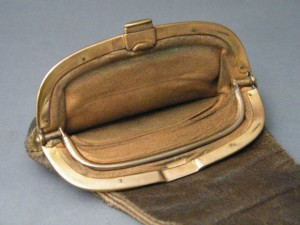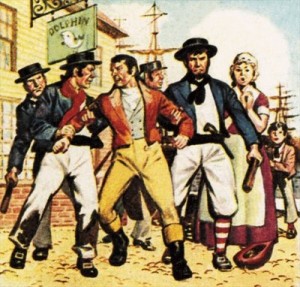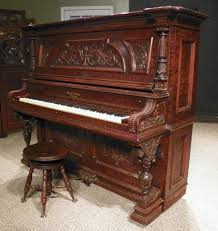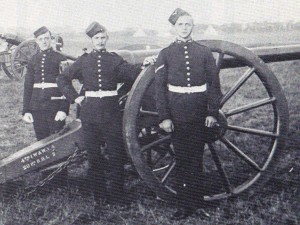Welcome to Swansea…..
At the Theatre 1806
Generally Swansea audiences in the nineteenth century were more interested in special effects rather than the drama itself. The standard of the performers was not always impressive.
Nor can we omit to remind Miss Morse, that when she is advertised for a part, the audience expect her to perform it; at present, she and the prompter play it between them.
During 1806 the company tried to take full advantage of the war with France through patriotically inspired productions which proved very popular with sailors, which in turn drew the attentions of the Press gang in search of recruits.
An affray occurred at the door of our theatre on Monday evening between three men, two of them brothers, and the other belonging to the impress service, in which one of the former stabbed the latter with a knife. The wound, it is hoped, will not prove fatal; and the offender has been held to bail until the sufferer be declared out of danger
Galvanic Stimulation June 1827
Sometimes unsupervised bathing in Swansea Bay was dangerous. On 20 June 1827 a young man went into the sea up to his chest and then disappeared from view “without cause, a few yards off the shore.” The poor boy’s body was recovered a few hours later. Mr Melhuish, with commendable enthusiasm, applied “Galvanic Stimulus” to him, meaning he applied a direct current from a battery.
“The lungs inflated, the muscles of the face, together with the eyes were considerably convulsed; but after persevering for nearly an hour, resuscitation was found impossible, the vital spark being completely extinguished.”
Everyone was so impressed that the admirable Mr Melhuish was invited to lecture on Galvanism the following day in the Town Hall when he included experiments with frogs andrabbits.
Obviously wobbling frogs was easy. Bringing the dead back to life required a bit more practice.
Louis Barree – March 1845
I am not supposed to be alone with you….
The hearing was held in private, but the reporters were able to present a summary of the evidence in the Cambrian newspaper, to the delight, no doubt, of a breathless public. “Its accuracy may be relied upon, having been obtained by our reporter from a good source.”
Louis Barree, a well-known and respected music and dancing master was accused of having indecently assaulted one of his pupils called Julia Probert, who was 10 years old. Louis Barree was involved in most of the musical activity in the town. He held concerts in the Assembly Rooms and at local regattas. He was leader of the local Harmonic Society and involved in Druidic Eisteddfodau. He had schools in Swansea, Neath and Carmarthen where he taught piano and his wife taught dancing and he sold pianos from a shop on the High Street. He had been renting the Assembly Rooms for lessons for five years.
The Proberts lived on Oxford Street and Julia had been a pupil for about a year. Early in the evening in March 1845 she went to the Assembly Rooms in Cambrian Place for her lesson. There was another lesson in progress when Julia arrived. Barree concluded the lesson and escorted the pupil and the mother to the door. On his return he took Julia to the fire and encouraged her to warm her hands. She thought this was odd since she didn’t think her hands were cold, but it is clear that Barree was thinking ahead.
He then started to touch her and to rub her over her clothes. He then took her to the piano stool and sat by her, lifting up her clothes and rubbing her again, though a portion of her clothing remained between his hand and her person. When a servant came in with candles to light the gathering gloom, he stopped. Then he told her to play the piano with one hand. He then laid hold of her hand and indecently applied it to his person. A portion of the evidence here is too disgusting in its details and utterly unfit for publication.
Possibly so but I think we can, just like the contemporary readership, work it out. Julia said she felt sick so “he picked her up and sat her on his knee, attempting to get her to lean backwards.” But another pupil arrived and so he told Julia to return for another lesson later in the week. She said nothing at the time out of fear but immediately she got home she told everything to her aunt, Elizabeth Davy.
Poor Julia was obviously frightened and confused. Barree seemed to have changed. Before Christmas he had described her as “a dull and thick-headed mortal” but somehow, and she didn’t know how, she had made significant improvement. Since January he had started to call her “little dear” and had started to touch her.
Now a mid-life crisis is all very well, and everyone has a right to have one if they wish. But they need to keep other people out of it.
It is a horrible story. To his credit Barree pleaded guilty, which meant that Julia didn’t have to appear in the dock. Defence counsel was desperate to mitigate the sentence. They said that he couldn’t face a fine, since the financial position of his family was not flourishing. He had a wife and two children and if he was driven into debt the family might never escape from the punishment.
The judge listened politely but was naturally unmoved. There was no doubt in his mind about his obligations. He could not remember a worse case of depravation of the mind. No one could have anticipated that he might entertain designs against her purity. The parents had not been neglectful. They had trusted him and he had betrayed them, trying to taint the purity of her mind. As everyone said, he had destroyed his position of trust as the teacher of the children of highly respectable parents. Of course, he said, he had never for a moment considered a fine. That would have been an insult to the feelings of the public. He was sentenced to one year’s imprisonment in Cardiff gaol.
Mrs Barree continued with her Dancing Academy in the Assembly Rooms for a while but moved out first to Fisher Street and then Prospect Place and later to Thistleboon in Mumbles. It would seem that she had washed her hands of her husband completely. On his release he emigrated to New York, whilst she stayed behind. Of course Louis Barree’s position in Swansea was completely untenable.
He died in New York in May 1851, aged 52.
Caroline Whitmore 1849 – 1863
Downtown girl….
If anyone was born on the wrong side of the tracks then it was Caroline Whitmore. She first appears in the press in May 1849 when she appeared in court, charged with stealing a shop knife. She is described as a questionable character at this time but when she next finds herself before the magistrate she is described as a prostitute who was drunk and disorderly in Back Lane (at the top of Orchard Street).
She is back five weeks later in March 1850, when the reporter describes her as an old acquaintance and a well-known character. He goes on to say she had A face brazened over with impudence on which a blush was never seen. Caroline was 25 years old and already had a certain notoriety. On this occasion she had created a disturbance in Cross Street. The police described her as a perfect pest when under the influence of liquor.
She promised faithfully to be a good girl and she did manage to keep out of the papers for a while. But in August she was charged by a man called Jenkins of stealing his purse containing 4s.6d. Jenkins was in Gloucester Place on an errand for his wife when Caroline attracted his attention. He entered into a loving conversation with her and he allowed her to place her arm around him. After they parted he found that his money had disappeared. She denied it of course. He had pestered her she said, when she was with another man. When questioned Jenkins admitted that he had followed her beyond his destination and in the absence of any evidence the case was dismissed.
And then she stays out of trouble for quite a while – for four years. Or at least she isn’t arrested in that time. She does seem to have had a bit of a temper though and this got her back in trouble in October 1855. She was charged with assault by a neighbour in Back Street. Edward Rees sent his daughter across the street to borrow a knife and fork so that he could eat his dinner. Caroline had been lodging with them for about three months and for some reason swore at the girl. Rees wife then became involved and more words were exchanged. Mrs Rees returned home but moments later Caroline started smashing their windows with a poker. When Rees went outside, she attacked him with the poker as well. Rees decided to turn her out of the lodging and soon there was a rolling fist fight between the two women ,which was why they had ended up in court. Since Caroline was a notorious prostitute and the house itself the resort of women of bad character, the Bench decided that Rees had brought all this on himself and the case was dismissed.
The following year she got into a row with two other professional ladies Margaret Powell and Rhoda Rees in Regent’s Court where they broke her windows. Margaret herself was in court all the time as well and in fact appeared next on the same day as Caroline in August 1855. Margaret’s head was adorned with a wreath of roses but her face was anything but attractive. She was charged by Police Sergeant Brooks of being drunk and disorderly in the High Street. She was sent to the House of Correction. Caroline was there because she had been breaking windows again. This time she pleaded guilty of breaking three panes of glass in the shop window of Mr Townsend in High Street. She threw a stone through one and took her clog off and used it to smash the other two. We don’t know why she did it but she was fined 14s 9d.
She clearly patched up her difficulties with Rhoda Rees because they were both accused of robbery in December 1855. They were charged with stealing two shillings from George Thomas in a brothel in Back Street. He was a recruit of 41st regiment and they picked him up in High Street. He agreed to accompany them home, believing presumably that his status as a soldier entitled him to special offers of the BOGOF variety. They escorted him upstairs then turned on him immediately in what the paper described as the usual fashion. Rees flew at him like a cat and fastening her fingers in his throat almost throttled him and whilst in this state Whitmore plunged her hands into his trouser pocket and abstracted the 2s. He was then bonneted – which means his hat was rammed down hard over his eyes – and then he was thrown into the street. It was an encounter that was over much more quickly than even he could have anticipated and it was not going to do his military reputation any good at all. But as the Bench said, what could he expect? Whitmore and Rees were cautioned about their conduct, described as dirty and slovenly and George was advised to stay away from such dens of infamy and vice.
She was back in court for threatening another professional colleague Elizabeth Thomas, and then for stealing a waistcoat in May 1856. But since the victim refused to appear in court, presumably out of shame, the case was dismissed. His name was Morgan Harry, in case you were wondering.
Caroline died on 23 September 1863, aged 38 and was buried in a communal grave in the cemetery in St Mary’s. Hers had been a hard life, lived in the poor and dirty backstreets of Swansea, a sink of illness and petty crime. And through these snatches from her life we can begin to form a picture of the town where she lived briefly and died too young. The greatest sadness is that Caroline was just one amongst many.
William Sanford September 1868
Jumping in front of guns
Being stupid isn’t just a modern phenomenon. There are occasion when it seems to be the young male’s default setting, no matter what the century.
It was early September 1868. It was Saturday afternoon. It was the South Dock embankment and the Artillery Volunteers were practising with their guns. People had turned up to see the show. After all, there was lots of precision marching, and loud noises. What more could you ask for? One of the people who turned up was William Sanford, a seaman. And he was drunk. PC 43 was eventually called by Colonel Francis to deal with him.
He was interfering with their practise by jumping about in front of one of the guns. Francis had tried to remove him but Sanford had hit him a few times on the body and the arms. Presumably he was just showing off, just “messing about,” as they still say today. But the Artillery were mightily irritated. They were in front of an admiring public and were not inclined to accept such behaviour with an indulgent and cheery smile, especially from a seaman.
The colonel and his men wrestled Sanford to the ground and he was handcuffed and taken to the police station. I am sure the Artillery regretted for a moment that Sanford hadn’t managed to get himself sprayed against the Mumbles across the bay. He was charged with being drunk and disorderly and brought before the police court. He was very embarrassed and said he had no memory of the incident at all.
The colonel pointed out that such misbehaviour around the cannons was not unusual, with acts of bravado and general showing off happening regularly, based upon a belief that the Artillery men would be reluctant to fire a cannon through a young man’s torso. But their patience was certainly wearing thin at the boys who kept entering the firing enclosure.
Sanford was fined 40s including costs for assaulting an officer.


